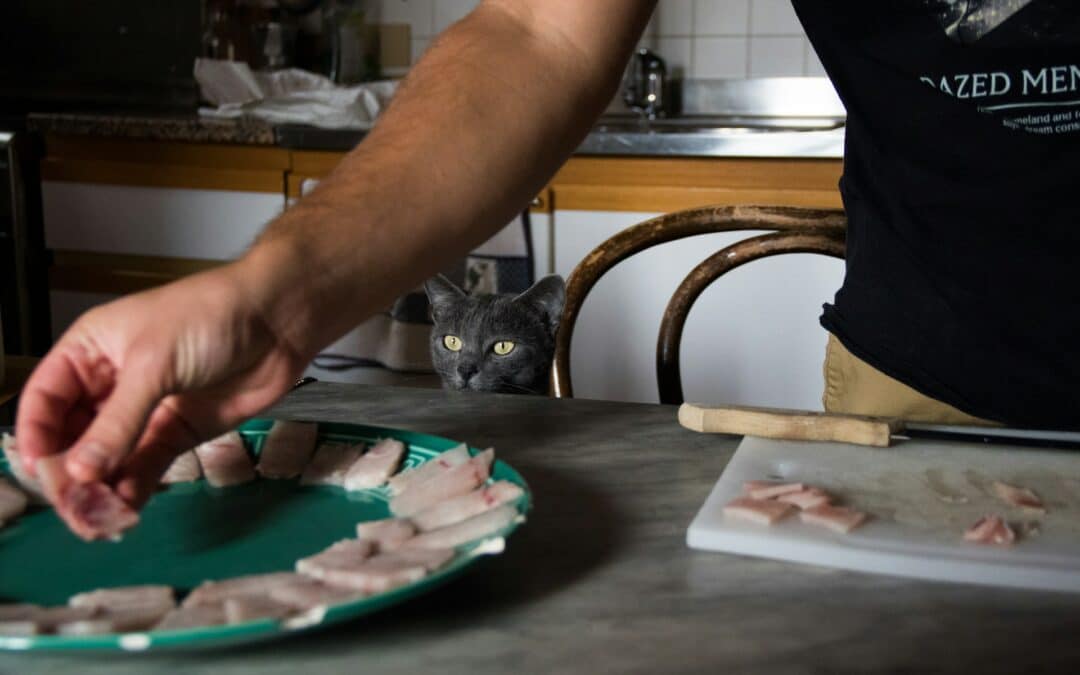We’ve been getting more and more questions about which foods are safe for cats and dogs. Those commercials for fresh food diets are everywhere, and they’re making many people question whether feeding their pet a standard dry food diet is actually healthy. Some ads feature testimonials about increased energy and a healthier coat, or digestive issues clearing up; others try to make you feel guilty for forcing your pet to eat nothing but processed kibble.
“I don’t want to feed my pet the same old thing every day, but I don’t have the budget for a meal subscription. What foods can I give my pet that are safe?”
If you have these same questions, we’re glad you asked. Changing your pet’s diet is not a move you should make without consulting a veterinarian. And as you probably guessed, there are a lot of foods that are dangerous and even poisonous to pets.
Three Things You Should Never Feed Your Pet
NEVER feed your pet raw meat.
Eating raw meat is dangerous, for obvious reasons. Pets can get E. coli infections or salmonella poisoning from raw meat, not to mention parasites.
NEVER give your pet bones.
Gnawing on bones can crack your pet’s teeth. Bones splinters and small bones can also cause choking, internal bleeding, or bowel obstructions.
NEVER share your own food with your pet.
When you cook for yourself, you use ingredients like oil and salt that are not safe for your pet. Prepared foods can cause digestive upset, obesity, and kidney problems.
What Can Dogs Eat? Which Foods Are Safe?
If you want to treat your dog to a home-cooked meal once in a while, that’s fine. Just don’t make it a daily habit, and don’t let your dog think they’re entitled to table scraps. Prepare their meal separately, and don’t ever add any salt, oil, sugar, or other seasonings.
Here are a few foods that are safe to feed your dog:
- Boneless, skinless turkey or chicken, simmered in boiling water until cooked through
- Cooked white rice
- Pumpkin puree or baked sweet potato
- Raw carrot or apple slices
- Unsalted, unsweetened peanut butter, for an occasional treat! Fresh-ground peanut butter is best, because it only contains peanuts.
What Can Cats Eat? What Should They Not Eat?
Although it might seem natural to pour your cat a saucer of milk, don’t do it. Cats only have the ability to digest milk when they’re kittens. Drinking milk or eating dairy products can cause vomiting, diarrhea, loss of appetite, and abdominal pain.
Cats are also extremely sensitive to alcohol. An amount as small as a teaspoon can be deadly, and even the yeast in bread dough can cause alcohol poisoning.
Although there are foods that are safe for cats, we don’t recommend feeding them any more than a tiny snack. One small bite is enough! If your cat is curious about the foods you’re eating, here are a few things you can let them taste:
- Bananas
- Broccoli or peas (steamed, no salt or butter)
- Melon (no seeds or rinds)
- Plain pumpkin puree or baked sweet potato (no butter, salt, or spices)
What Foods Are Toxic to Pets?
Chocolate, alcohol, onions and garlic, grapes and raisins, are toxic to both cats and dogs. There are many other dangerous foods as well. But no matter how careful you are, pets can sometimes get into trouble and eat things that they shouldn’t. If your pet shows any signs of poisoning (vomiting, diarrhea, lethargy, excessive thirst, convulsions, or trouble breathing) go to an emergency vet right away.
Before You Change Your Pet’s Diet, Consult a Vet
We know that you only want to make your pets happy, but when it comes to feeding them, you have to be careful. If you have questions about the best foods for your cat or dog, make an appointment at Anasazi Animal Clinic in Gilbert. Our vets can provide personalized recommendations based on your pet’s dietary needs. Contact us to schedule an exam today.
Photo by Oscar Chevillard on Unsplash used with permission under the Creative Commons license for commercial use 1/31/25.

